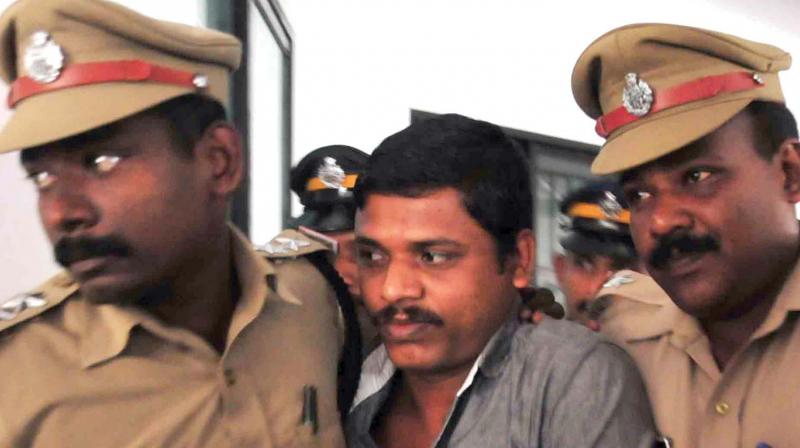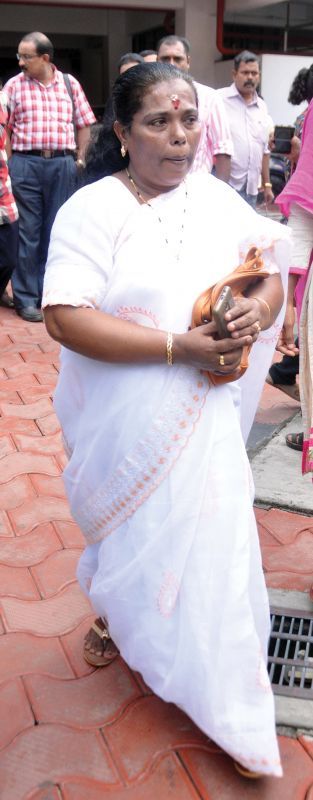Jisha murder case: Court gives thumbs up to special investigation team
Team used modern, progressive scientific methods to prove case.

Kochi: The Ernakulam Principal Sessions Court, which found lone accused Ameer-ul Islam guilty in the Jisha murder case, lauded the investigation team headed by officer S. Sasidharan for making use of modern and progressive scientific methods to prove the case “beyond a reasonable doubt”. “…The DNA technology and call data records helped in establishing the individual identity of the accused…and proving the charges against the accused beyond any reasonable doubt,” special judge N. Anil Kumar observed in his judgement. In the absence of direct evidence, the prosecution mainly relied on scientific and circumstantial evidence to prove the case.
There is no direct witness to the convict entering the victim’s house or attacking her. The neighbours too didn’t hear any sound or screaming on the evening of April 28, 2016, when the crime was committed. The investigation team succeeded in recovering the accused’s DNA from the nail clipping of the victim besides that from saliva and blood stains found in the churidar she wore on the fateful day which confirmed “presence” of the Assamese in the house. The probe team also managed to retrieve his DNA from a pair of slippers that he left behind while crossing the canal as he fled the victim’s house after committing the crime. They also recovered the knife he used and managed to trace DNA of the victim from the bloodstain in it.
The police also succeeded in tracking his movement as he fled to Assam soon after the crime, from his mobile phone and the call recordings. Special public prosecutor N K Unnikrishnan said the investigation team didn’t attempt to create fabricated evidence at any stage. “They failed to recover the dress worn by the accused while committing the crime. Similarly, he told cops he had thrown away the liquor bottle he had brought to the house of the victim to the empty courtyard behind her house. During the search, they recovered many liquor bottles but stated that they couldn’t find out the specific one. The case was won mainly by DNA test results,” he said.
Crime & conviction
April 27, 2016, 11.30 p.m. – Somebody pelts stones at the asbestos house of Jisha while she and her mother were sleeping. They check outside but find none. Next morning, they find a beedi and lighter near the house (the cops found during the probe that they belonged to Ameerul Islam)
April 28, 6 p.m. – A neighbour sees a man clad in yellow T-shirt walking from the backyard of the victim’s house and crossing the canal near the house.
April 28, 7.30 p.m. – The victim’s mother returns from work and alerts the neighbour when her daughter fails to respond to calls. Neighbours inform police who found her semi- nude body with over 30 stab wounds.
April 29 – A police team under Kuruppumpady CI conducted inquest and collected crucial evidence.
June 14 – SIT arrests Ameerul Islam, an Assamese native who went missing from Perumbavur soon after the murder, from Kancheepuram in TN.
September 17 – SIT submits chargesheet.
April 4, 2017 —Trial begins at Principal Sessions Court, Ernakulam.
December 12 – Court finds Ameerul Islam guilty.
Jisha’s assailant had no knowledge of her caste
The Ernakulam Principal Sessions Court, while convicting lone accused Ameerul Islam in the Jisha murder case, pronounced the Assamese migrant not guilty of two charges – evidence destruction and the violations under the SC/ST Prevention of Atrocities Act 1989. It observed that the accused had no idea of the victim belonging to the Scheduled Caste when he committed the offence.
“In the absence of knowledge on the part of accused about the caste identity of the victim, the charges under the SC/ST (PoA) Act 1989 doesn't arise,” special judge N. Anil Kumar said in his judgement. As for the evidence destruction charges, the court observed that the prosecution argued that the accused told investigating officers that he had thrown out the dress he wore while committing the crime and left for home in a train on the night of April 28, 2016, the day when the crime was committed.
“However, it turned out to be false and said with an intention to mislead the probe. The information leading to recovery alone is admissible and hence the charges won’t apply,” the court said. The court found him guilty of all other charges including rape (section 376 IPC), murder (section 302), causing death or resulting in a persistent vegetative state of the victim (Section 376 A), wrongful confinement (section 342 IPC) and house trespass (Section 449 IPC).
Charges warrant 20-year jail term
The Ernakulam Principal Sessions Court, which found Assamese Ameerul Islam guilty in the Jisha murder case, is likely to pronounce the quantum of punishment on Wednesday. The proven charges against him warrant a minimum of 20 years in prison while special public prosecutor N. K. Unnikrishnan said the prosecution had demanded capital punishment. “The court found the victim was brutally attacked before being raped and murdered. This falls under the rarest of rare cases and warrants capital punishment,” he said.
However, defence counsel B. A. Aloor stated that the court order is the “biggest punishment that can be given to an innocent individual”. “There is more than one person involved in the murder, but the police didn’t probe this angle. Now since the court accepted the IPC 302 charge, we’ll argue for the minimum punishment, ie life imprisonment,” he said soon after the court convicted him. Islam, upon hearing the verdict, claimed he was innocent and picked up by police without any reason. Initially, he couldn’t understand the judgment. The court then asked if anyone could translate the same. Adv Asha N.P., who came to watch the case proceedings, volunteered.
 Rajeswari, mother of Jisha, comes out of court in Kochi on Tuesday. (Photo: SUNOJ NINAN MATHEW)
Rajeswari, mother of Jisha, comes out of court in Kochi on Tuesday. (Photo: SUNOJ NINAN MATHEW)
Meanwhile, the victim’s mother Rajeswari said she wanted the court to hand down capital punishment and nothing less. “The punishment should have a deterrent effect, and no more mothers should witness such a tragedy happening to their daughters. I’m satisfied with the court finding today but will go for an appeal if the quantum is anything less than the capital punishment,” she said.

